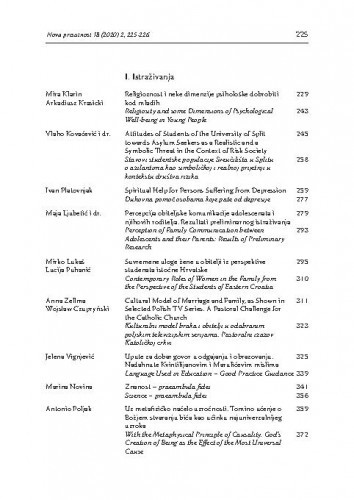U ovome radu razmišlja se o govoru u djelatnostima odgoja i obrazovanja te o govornim sposobnostima potrebnima odgojitelju, učitelju i nastavniku za uspješno upućivanje djece i mladih ljudi u proces stjecanja znanja, ali i vrlina potrebnih za dobar život i suživot s drugima. Pritom se na odgojiteljev (učiteljev, nastavnikov) govor gleda kao na jedinstvo dviju njegovih nerazdvojnih sastavnica – komunikacijske i retoričke. Ističe se, danas često zanemarena, potreba njegovanja i retoričke sastavnice odgojiteljskoga govora, ne samo komunikacijske. U tom se kontekstu donose izabrani retorički naputci za govor u odgoju i obrazovanju, oprimjereni mislima rimskoga retoričara Kvintilijana te europskoga i hrvatskoga kršćanskoga humanista Marka Marulića.; This paper contemplates the language used in education as well as the linguistic skills that pre-school teachers and teachers need to master so that they may introduce children, pupils and students into the process of knowledge acquisition and, no less importantly, the acquisition of the virtues one needs to have in order to lead a good life and live harmoniously with the individuals in their environment. The language of the (pre-school) teacher is here viewed as consisting of two inseparable components – communicative and rhetorical. The focus is on the need to cherish not only the communicative component of the (pre-school) teacher’s language, but also the rhetorical one as the latter is often neglected in the present day and age. The rhetorical component of the (pre-school) teacher’s language is exceptionally important in the instructional language used by the pre-school teacher or teacher to communicate the taught material to the students as well as in the relational speech used by the (pre-school) teacher in child nurture; i.e. in mediating when working to solve children’s problems and conflicts, in creating positive relations between individuals in an educational establishment, in creating efficient relations with the parents of the children that are being cared for, etc. In the mentioned context this paper delivers good practice guidance for (pre-school) teachers related to the values good language used in education should have. The text is inspired by two canonical European masterpieces: the work of the Roman rhetorician Marcus Fabius Quintilianus Institutio oratoria (1st century) and the work of the European and Croatian Christian humanist Marko Marulić Institutione bene vivendi per exempla sanctorum (16th century). Many parts of the selected works are very much applicable in the education of young people today, even though centuries apart from the circumstances in which those works were created.
Sažetak

 Nova prisutnost : časopis za intelektualna i duhovna pitanja : 18, 2(2020) / glavna i odgovorna urednica, editor-in-chief Katica Knezović.
Nova prisutnost : časopis za intelektualna i duhovna pitanja : 18, 2(2020) / glavna i odgovorna urednica, editor-in-chief Katica Knezović.